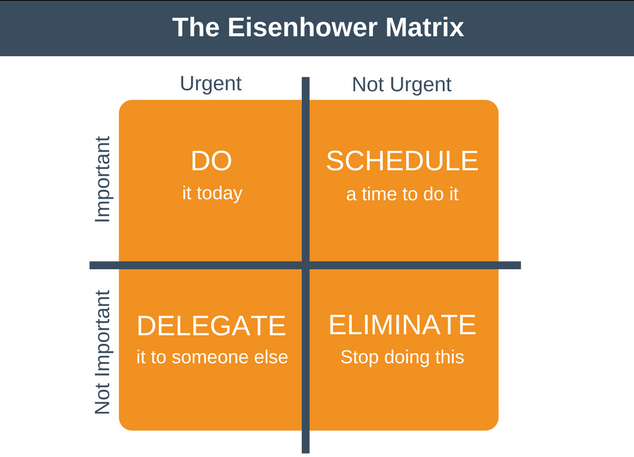Urgent vs. Important: Here’s the Best Way to Stay Productive

“What is important is seldom urgent and what is urgent is seldom important.” – Dwight D. Eisenhower. Have you ever felt like your day was super busy but you didn’t get much, if anything, done? For the entire day you were responding to urgent tasks like answering calls, texts and emails. While in between having meetings, catch ups and putting out impromptu fires. Yet, at the end of the day, you still have a long list of things to do.
This is the case for most people; where our days are filled with urgent but often trivial tasks. The example to describe this is my favorite; it states that these days in particular are like paying off a high interest credit card. You’re working yourself to the bone but barely making a dent in the principle. To combat this, you will need to understand the difference between urgent and important. Here’s a breakdown on the two so you can stay highly productive.
The Difference Between Urgent and Important
An urgent task is something that requires immediate attention. These are the tasks on your list that put you in an instant reactive mode. Oftentimes, it’ll give you a feeling overwhelm, stress, negativity and keep you narrowed focused. Your attention during that time, will be largely focused on accomplishing that task at hand. Examples of urgent tasks are phone calls, texts, emails, impromptu meetings and impending deadlines.
An important task is something that contributes to a long-term mission and/or goal(s). These are the tasks that will help you in the long run to achieve the end goals that you’re working towards. Important tasks can be urgent but typically they’re not. Working on these tasks will put you in a responsive mode where you’re calm, rational and open-minded. Examples of important tasks are reading a book, exercising, family time, weekly planning, studying or maintenance.
The Mistake You’re Currently Making
The mistake you’re currently making is letting urgent tasks trump important tasks. If you have a limited amount of time during the day, you need to ensure that you set aside time for those important tasks. Frequently, we fall into the trap of believing that all urgent tasks are also important. This is heightened with today’s society of modern technology where we feel obligated to immediately respond to tweets, DM’s, comments etc. Thus wasting time and putting an urgent yet non-important task over one that’s truly important. In result, it’s easier more than ever to feel burnt out while stunting our growth both personally and professionally.
How to Decide What’s Important Using the Eisenhower Decision Matrix
The matrix decision box was designed and developed by Dwight Eisenhower. He was a five star general in the US Army, the Supreme Commander of the Allied Forces in Europe during World War II, President of Colombia University and a two-term US President. The matrix consists of four boxes that are labeled: Important/Urgent, Important/Not Urgent, Not Important/Urgent and Not Important/Not Urgent.

Box 1: Important/Urgent
Box 1 consists of tasks that are both important and urgent. They require immediate attention and helps to move us towards our long term goals and missions. Some examples of important/urgent tasks are:
- Specific emails (job offer, business opportunity or anything that requires immediate attention)
- Deadlines (taxes, bills, presentations, etc.)
- Car repair (flat tire, engine dies, totaled car etc.)
- You or immediate family in hospital
- Household chores
Many tasks that land in the important/urgent box, can be handled more efficiently or eliminated completely. For example, instead of waiting until the last minute to do your taxes (thus turning it into an urgent task), you could schedule time to work on them each day. This will result in your taxes being completed a week or two in advance prior to the deadline.
Box 2: Important/Not Urgent
Box 2 consists of important but not urgent tasks. They don’t require your immediate attention but significantly helps you to reach your end goals and missions. This is the box that you should spend most of your time in; it will help you eliminate the number of tasks that spill into box 1. Additionally, this box will keep you productive and in control of how you manage your days. Some examples of important/not urgent tasks are:
- Long-term planning
- Weekly planning
- To Do list
- Exercising
- Writing in a journal
- Family and/or friend time
- Enhancing your personal development (reading, taking a course, attending a conference etc.)
- Studying
- Car and home maintenance
Spending most of your time in this box will keep you productive, calm, happy, fulfilled and successful. However, if you don’t have end goals, values or a mission to work towards, you won’t know which tasks you should be spending most of your time on. Additionally, most tasks move from important/not urgent box to important/urgent box because a lot of people lack self discipline. It’s imperative that you don’t procrastinate on important tasks that have deadlines and wait until the last minute to get them done. You need to schedule time for your important tasks while they aren’t urgent so you can stay in control.
RELATED: 9 Strategies for Getting More Work Done in Less Time
Box 3: Not Important/Urgent
Box 3 are tasks that aren’t important but require your immediate attention now. They do not help you achieve your end goals or fulfill your missions (both of which are important). Most tasks that fall into this box, are interruptions from other people, that require your help to move them closer to their end goals and/or missions. Some examples of not important/urgent tasks are:
- Impromptu meetings
- Phone calls
- Text messages
- Tweets, DMs etc.
- Most emails (anything that requires your immediate attention yet isn’t of importance)
- Unannounced visits
- Someone needing help with something
I guarantee that you spend a majority of your time within this box thinking that you’re working and getting tasks done. This is the sneaky box because you’re helping others with tangible tasks that they deem important. Therefore, once these tasks are completed, you also feel a sense of accomplishment and gratitude. The problem is, these tasks need to be balanced out with your important/not urgent tasks. If no balance is established, you will quickly find yourself burnt out and stagnant in growth towards your personal goals. It’s important not to constantly please others at the expense of your own happiness!
Box 4: Not Important/Not Urgent
Box 4 are the activities that’s not important and not urgent. They’re what I like to call time wasters, which primarily distract you. These tasks do not help you get closer to your goals and they aren’t important at all. Some examples of not important/not urgent tasks are:
- Scrolling on social media
- Watching TV
- Playing video games
- Surfing on the web
- Gossiping
In my Girl, You Got This program, the first thing I tell my students to do is a time audit. This is where they track every single task and the time that was spent performing it. After a week of time auditing, each and every student found that they spent a large amount of hours within this box. Personally, I believe in balance and that you should have a few hours throughout the week dedicated to this box. It’s the time where you can “turn off” and not critically think. Our bodies and minds need this so they can recharge and avoid burnout. A safe amount of time to dedicate to this box daily would be 1 hour; especially if you find yourself in box 1 often.
How to Utilize the Matrix Properly & Boost Your Productivity
You will need to make important tasks urgent to utilize the matrix properly and boost your productivity. This is totally different than box 1 where the tasks are urgent/important however, you will operate as such. For example, before an important task turns urgent, you will have completed it a few weeks prior to the deadline. In order to do this, you will need to stay disciplined and set specific goals. Give all of your important tasks deadlines before the actual deadline! This way, it’s scheduled and has your attention but doesn’t make you feel overwhelmed or stressed out. Since it’s a deadline that’s not urgent, you may not take the deadline seriously. To combat this, you can pick a few ways to make your deadlines significant.
First option that comes to mind is telling everyone you know about your task and its deadline. If you’re sensitive to public opinion, you won’t want to look like a liar by having that deadline come and go without you accomplishing it. Secondly, you can create rewards and punishments for yourself. If you finish the task by the deadline, you get a reward for executing it. However, if you miss the deadline, you don’t get distraction time for that day. Another way to make your deadlines significant is by having a success partner. This person will be there to ensure that you’re doing the work and getting things done. Lastly, you can set constant reminders for yourself to stay on track with your deadline. This can be easy by utilizing your phone, sticky notes or someone reminding you.

Putting it Altogether
Utilizing the decision matrix will most definitely help you to streamline and prioritize your everyday tasks. Before you make the decision to work on something, ask yourself why you’re doing it. Is this task important or urgent? Spend most of your time in box 2 and I guarantee that you’ll 10x your productivity, boost your confidence, keep control of your day and have a calm sense of fulfillment!
Until next time ASSASSINS. . . Stay Disciplined!
Let’s be friends!
Follow me on Instagram @MissAshleyAllison Twitter @MsAshleyAllison and Pinterest @MsAshleyAllison.




2 Comments on Urgent vs. Important: Here’s the Best Way to Stay Productive